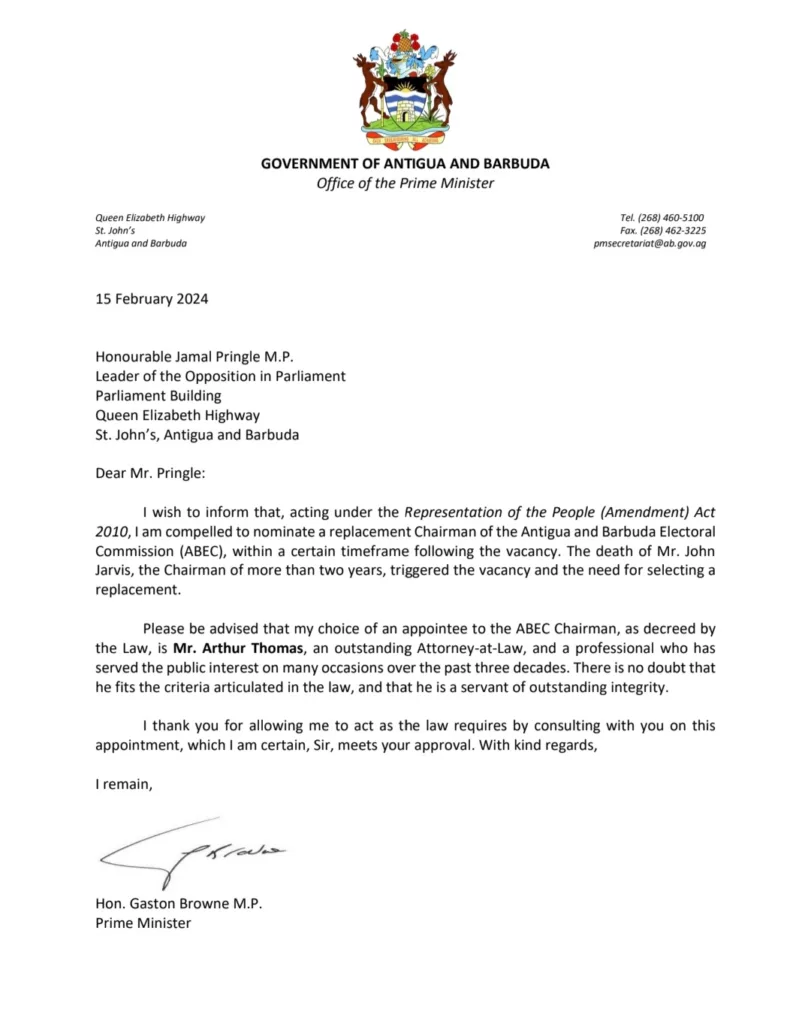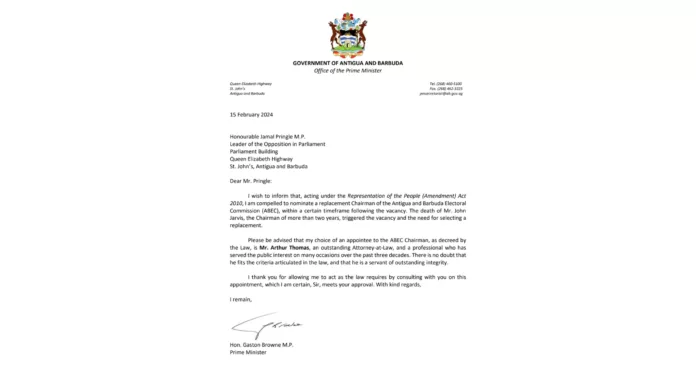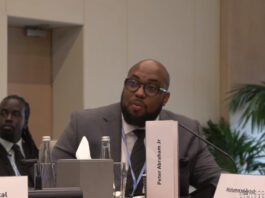By Elesha George
The recent appointment of Attorney Arthur Thomas as the Chairman of the Antigua and Barbuda Electoral Commission (ABEC) has sparked debates regarding the country’s reputation on the global stage.
With Thomas assuming this pivotal role for the next seven years, concerns have been raised about the potential implications of his past associations and the lack of opposition support for his appointment.
Already Thomas’ appointment has been shrouded by doubt over his integrity to hold the position as a result of his prior association with Sam Bankman-Fried, the founder of crypto currency firm FTX. FTX was duly registered and incorporated in Antigua though no business took place here. Prime Minister Gaston Browne said it was ‘prudence’ that luckily prevented the Financial Regulatory Services Commission (FSRC) from licencing the exchange company.
Akaash Maharaj, the Chief Executive Officer of the Global Organization of Parliamentarians Against Corruption (GOPAC), said it is up to the citizens of Antigua and Barbuda to determine the legacy of their institutions and its reputation on the global stage, as he weighed in on Thomas’ appointment.
“Even though Mr Bankman-Fried did not succeed in making Antigua his entire base of operation, one has to ask oneself of all the countries in the world, why did he choose to plant this massive, organised crime syndicate in Antigua and Barbuda and the answer has to be, because he thought he could get away with it,” remarked the CEO.
Bankman-Fried ran his operational headquarters in The Bahamas. Bankman-Fried, currently facing charges in the United States related to fraud and money laundering, had named Thomas as one of three directors at FTX.
“Notwithstanding the fact that he was thwarted there is a sense by people outside of the country that at least some of the institutions are for sale. That is not a sense that the people of Antigua and Barbuda should be proud of as they should be fighting to ensure that that is a sense that goes no further,” he insisted.
While Thomas himself has not been convicted or charged with any wrongdoing, some believe that his reputation is tainted by association. The opposition party for example believes that now is not the time for Thomas to take up such a crucial position given his past affiliation.
Thomas resigned as chairman of the Caribbean Union Bank (CUB) and chairman of the Eastern Caribbean Securities Regulatory Commission while investigations were ongoing into Bankman-Fried, the now convicted founder of the defunct cryptocurrency exchange.
The opposition United Progressive Party (UPP) objected to Thomas’ concluding in a press statement that “if his connection to these entities was enough for him to resign, why should he head the body charged with safeguarding the practice of fair elections?”
Maharaj believes that the opposition has raised legitimate questions over Thomas’ integrity as the new chairman of the electoral commission.
“They are right to raise the issue and right to express their concerns,” he said, noting that the electoral commission plays a critical role in ensuring the integrity of Antigua and Barbuda’s elections and as such anyone who leads that body should be above reproach.
As mentioned previously, it has not been revealed that Thomas has done anything wrong except, according to the US trial, there was no real oversight of FTX.
“In effect, there was no genuine business going on at FTX’ … ‘it was a colossal ponzi scheme, a multimillion-dollar ponzi scheme,” Maharaj noted.
“One would expect the directors of a corporation to exercise a minimum due diligence in ensuring that the company really is a company. That at a minimum raised legitimate questions about Mr Thomas’ diligence in his role as a director.”
Maharaj added that even though Thomas may be an excellent person with excellent skills, he does not have the confidence of both the governing party and the opposition party which is “not a good start to his tenure”.
Opposition not Consulted
The Representation of the People Act (ROPA) (Amendment) Act 2001 itself speaks to the integrity of the people nominated to serve on the commission.
Even more important is that, according to Section 3 of the ROPA which addresses the Establishment of the Electoral Commission, there is a legal obligation for the prime minister to consult with the leader of the opposition. “The Chairman and two other members of the Commission shall be appointed by the Governor-General, acting on the recommendation of the Prime Minister after consultation with the Leader of the Opposition”, the act reads.
But UPP Chairperson D Gisele Isaac said opposition members, including the leader Jamale Pringle found out about Thomas’ appoint just like everyone else. “We hadn’t heard anything indicating that there would be any kind of consultation with the leader of the opposition,” she said.
“I can tell you for a fact that when brother Jamale Pringle had to make his appointment for the deputy chair of ABEC, he wrote to the prime minister with his recommendation and the prime minister acknowledged and wrote back and said he had no problem with the proposed person. So, we consulted, the prime minister knew ahead of time who we recommended as deputy chair. We heard just like everybody else about Arthur Thomas’ appointment,” Isaac explained.
Observer has reached out to Prime Minister Browne to ascertain the reason for not informing the opposition but up until news time, he did not respond. However, the Chief of Staff in the Prime Minister’s Office, Lionel Hurst, shared a communique that was written to Pringle, dated February 15 – one day before Thomas was sworn in. Based on the opposition’s account, however, it does not seem that this letter had been received.

Meanwhile, Thomas has told Observer that he understands opposition forces – or any citizen’s right to raise questions but there is also an obligation on persons raising questions to ensure the factual basis on which they speak is correct.
He also said that his reputation has not been in any way impugned, and he does not believe that government would have reposed the confidence that they did, if his integrity was in doubt.
Meanwhile, Bankman-Fried was convicted in the US on a string of fraud, conspiracy and money laundering charges last November and is expected to be sentenced next month.




